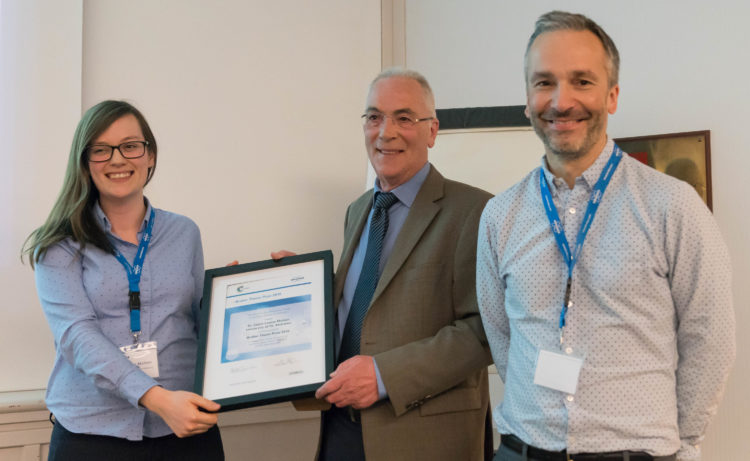St Andrews graduate wins prestigious award

A University of St Andrews graduate has won a prestigious prize for her PhD thesis which found a way of more accurately measuring the behaviour of proteins.
The discovery could help understand the mechanisms behind certain diseases and to develop new drugs to treat them.
Dr Claire Motion, who graduated in 2012 with an MPhys (Hons) in Physics and achieved a PhD in 2018, was presented with the Bruker Thesis Prize from the Royal Society of Chemistry’s Electron Spin Resonance (ESR) Group.
The Prize is awarded for outstanding work, and the best PhD published in the world that year in the field of ESR Spectroscopy.
Dr Motion’s research found a way to improve the accuracy and sensitivity of a special state-of-the-art ESR spectrometer built by the University.
Her work used free radicals as site-specific ‘molecular spies’ implanted within larger biomolecules, which could then be interrogated with microwaves, as a means to understand the local biomolecular structure and how different biomolecules interact with one another.
Dr Motion said: “I’m delighted to have received this award from the Royal Society of Chemistry Electron Spin Resonance Group, and kindly provided by Bruker, for my thesis work.
“I owe a lot of thanks to my supervisors, Professor Graham Smith and Dr Janet Lovett, as well as to the fantastic teams of collaborators and researchers I’ve worked with along the way.”
Beyond research into disease, the industrial applications of EPR expand into many fields of physics, chemistry and biology, including studying defects in crystals, in the manufacture of thin-film electronics for new organic semiconductors.
Since completing her PhD, Dr Motion now works as a Senior Systems Engineer for aerospace firm, Leonardo.
Photo caption (left to right): Dr Claire Motion receiving her winning certificate from Dr Peter Höfer, Business Line Manager EPR at Bruker BioSpin, and Professor Eric McInnes, Chair of the Royal Society of Chemistry Electron Spin Resonance Group and Professor of Inorganic Chemistry at the University of Manchester Issued by the University of St Andrews Communications Office.